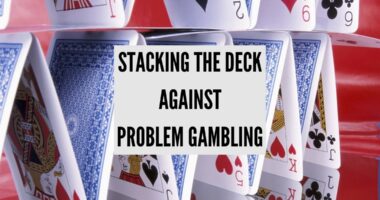North Carolina Uses A ‘Stacked Deck’ To Lower Underage Gambling

It’s not uncommon for children or adolescents to sneak into convenience stores to gamble away a few dollars in the US. Today it’s even easier for kids to sneak around online to place a bet inside the games they’re already playing. In a North Carolina Department of Health and Human Services survey of 800 minors who participated in the state’s Stacked Deck problem gambling prevention program, 16% of middle school and high schoolers were playing slot machines in 2022, double the number from 2013.
Why did it double? Increased availability is one factor, but it’s also the video gamification of slot machines. Adolescents who are engaged in gambling face an increased risk of developing problems related to gambling, says Amanda Winters, Program Administrator for the North Carolina Problem Gambling Prevention Program. Gambling messaging is everywhere, and, many times, kids get social media messages and pop-up ads promoting ‘
real money’ games, which often are associated with illegal operators. These operators do not face the same regulations as legalized gambling operators and may misrepresent the odds of winning.
Notable preliminary findings from the 2022 Stacked Deck comparison after intervention include:
- Games of skill dropped from 29% to 26.3%
- Microtransactions dropped from 29.3% to 27.3%
- Social casino games remained unchanged at 17.1%
- Internet gambling increased from 18.4% to 19.1%
Much like California, a state that focused on providing gambling education early, North Carolina also has seen the value in being proactive. To help reduce and prevent problem youth gambling, North Carolina’s Health and Human Services Department created the evidence-based Stacked Deck program for middle school and high school students. The five-lesson program is taught throughout at-risk community centers, middle schools and high schools. It aims to change attitudes, beliefs, knowledge, behaviors and misconceptions around gambling.
Gambling behavior of young people
In 2022, adolescents who completed the Stacked Deck program dropped from 41% reporting gambling activity that intersects with video gaming to 36% afterward. These types of gambling can include making bets with other video game or esports players and microtransactions/in-app purchases.
Before completing the Stacked Deck program, 31% engaged in more traditional forms of gambling such as lottery tickets, scratch-offs, slot machines, dice and cards. That number dropped to 28% after completion of the program.
Historic statistics from students completing the Stacked Deck program over the past decade showed decreases since 2013 in games of skill such as pool, golf, and darts from 35.1% to 26.3%. Lottery and sports betting also decreased. However, dog or horse racing and internet gambling has doubled. Skin purchases, esports betting, skins betting, loot boxes, microtransactions, and social casino games officially became part of the survey in 2022 as technology plays a bigger role in youth gambling.
What families, regulators and the community need to know about problem gambling
How minors access gambling
Young people access gambling in their communities and online, says Alison Drain, Youth Prevention and Treatment Specialist with North Carolina Problem Gambling Prevention Program. There has been an uptick in the risks associated with developing problem gambling due to the accessibility of online gambling and the high-frequency betting opportunities provided within betting platforms. Illegal offshore sports betting operators allow anyone to create an online account and bet on multiple aspects of a single sporting event, regardless of their age. Legal US operators have responsible gaming practices in place to keep underage players out.
Understanding the lingo
While most adults know what a scratch-off lottery ticket is, they may not be familiar with loot boxes or skins betting. A loot box is a virtual box a player buys in a video game where they don’t know what’s in the box at all. The item could be of high or low value. It’s just like inserting a quarter into a gumball machine and not knowing what flavor you’ll get. Skins betting occurs in an app or video game when a player uses their own skins (cosmetic/aesthetic items that don’t improve their skills such as hats or sunglasses) to bet on the outcome of a game. Trading skins is common and young people may need the aspect of betting explained to them, when that comes into play. Knowing the lingo, parents can ask their children if they are making purchases of either online, especially if their allowances are the source of the cash.
Teach coping and risk assessment skills
People who experience problems with gambling often also face additional medical and mental health diagnoses and other co-occurring needs, so it’s important to teach youth how to recognize signs of developing a problem with gambling and where they can turn for help. North Carolina offers free treatment and recovery services for both adolescents and adults who may be experiencing problems. More information can be found at morethanagame.nc.gov, or by calling the free confidential helpline at 877-718-5543.
“Research online platforms that can provide education and assistance on conversations to have with adolescents,” says Winters.
Programs like Game Quitters and REBOOT Recovery provide a place for anyone in need of recovery services. Therapy or a course such as Stacked Deck also helps.
Explain how gambling can involve losing
With young minds that get excited about imaginary bonuses in slot machine games, it’s not always clear gambling can also involve losing money. Share your own stories of gambling and look up stories on people who have lost considerable amounts. If you gamble, make sure your kids know that you do it as entertainment with a planned budget.
A few extra tips for communities, schools, regulators and operators:
- Uncover grant dollars
In North Carolina, apply for a Stacked Deck mini grant as a school or community center. Dozens of mini grants are currently awarded. If not in North Carolina, look for grants from your state or private industry. For instance, The NFL offers grants for youth outreach as well.
- Use a multi-faceted approach
The North Carolina program thinks about overall mindset, not just problematic gambling. Since kids often try other high-risk behaviors, developing youth programs for managing risk and developing better coping mechanisms often involves an “all of the above” approach.
- Fight for funding and policy
Funding for problem gaming programs is often in short supply. Ask legislators and state mental health providers to fund programs and create policies to support them. When in doubt, talk to other states and programs on how they got funding and what free resources they can share. The best part of this community is just how eager they are to share information with those in need.








